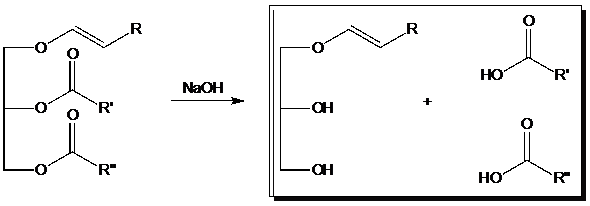The two methods give identical rate constants.
Hydrolysis of vinyl ether.
Xx with permission from the centre national de la recherche scientifique cnrs and the royal society of chemistry.
The journal of organic chemistry 1997 62 22 7858 7862.
Direct synthesis of cyclic ketals of acetophenones by palladium catalyzed arylation of hydroxyalkyl vinyl ethers.
In the example the oxygen atom in methyl tert butyl ether is reversibly protonated.
The reaction is first order in ethyl vinyl ether and first order in hy.
The resulting oxonium ion then decomposes into methanol and a relatively stable tert butyl cation the latter is then attacked by a nucleophile halide here bromide.
It was found that vinyl ethers are very sensitive to hydrolysis and a small amount of water in a copolymerizaton system may cause them to decompose producing acetaldehyde and corresponding alcohol or glycol.
Thus during the copolymerization of vca and vinyl ethers the evolution of acetaldehyde could be detected because of traces of water.
The unimolecular s n 1 mechanism proceeds via a carbocation provided that the carbocation can be adequately stabilized.
Vinyl mathrm sp 2 cations are very unstable and an mathrm s n1 type dissociation of meoh is very unlikely.
For reproduction of material from njc.
The kinetics of the acid catalysed hydrolysis of ethyl vinyl ether in aqueous solution have been measured by following the disappearance of the ether and by following the appearance of acetaldehyde.
It is nucleophilic on the α carbon and you can protonate it on that carbon almost like you are tautomerising an enol back to a ketone.
1 instead you need to use the fact that an enol ether is very much like an enol.
Silyl enol ethers can be dihydroxylated with osmium tetroxide to provide α hydroxy carbonyl compounds after hydrolysis.
Methyl vinyl ether is an organic compound with the chemical formula ch 3 och ch 2 a colorless gas it is the simplest enol ether it is used as a synthetic building block as is the related compound ethyl vinyl ether a liquid at room temperature.
4 osmium tetroxide is a well known dihydroxylation agent of alkenes and although osmium tetroxide can be used in stoichiometric amounts the highly toxic nature of the reagent has made catalytic versions of the oxidation.
Pdf on oct 1 1961 h r warner and others published the metabolism of plasmalogen.

